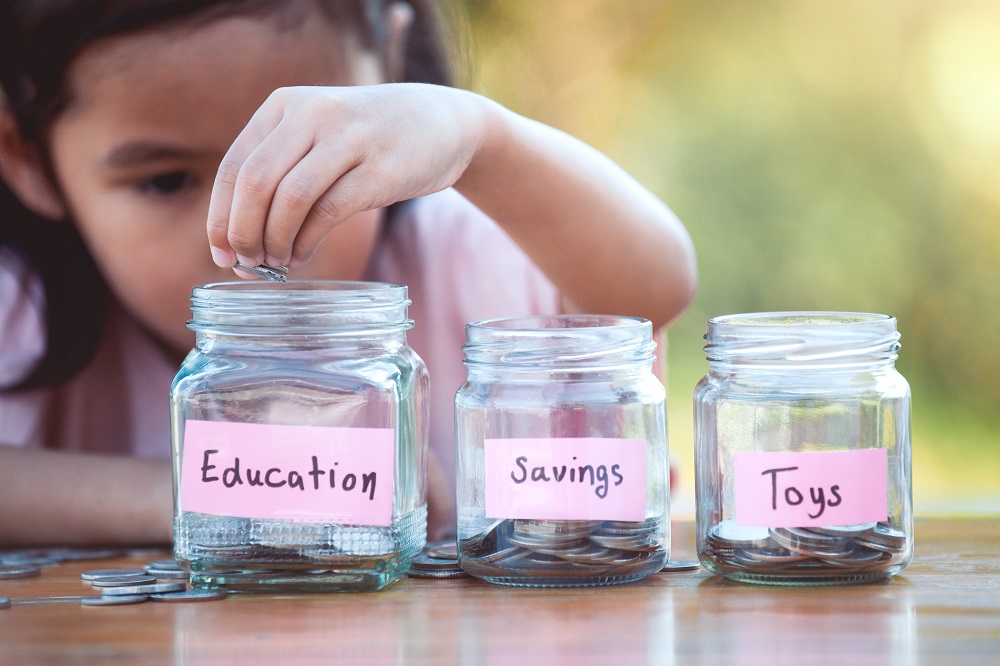Understanding money can play a pivotal role in your child’s future, their financial health, and their independence. But oftentimes, outside factors confuse these positive attributes with establishing money as a moral foundation. While finances may act as the means to many ends these days, it’s important to generate an early balance of understanding for your children so that they can become responsible, informed people.
If you’re interested in striking that balance, keep reading for a comprehensive guide on raising financially literate kids who understand that there’s more to life than money.
Start the Conversation
It’s important to understand early-on that life-centric education will be unmatched for the development of your child’s relationship to just about anything. It allows them to become a friend, partner, colleague or teammate. It shows them how to manage their money, invest in their futures, and determine their ability to afford a house, car, or other major item. With the sheer amount of saving and preparation that goes into these large investments, it’s important for them to grow into an understanding of concepts such as credit scores and debt to achieve their financial goals later on. Moreover, real-life education allows your children the perspective and experience needed to be citizens in an ever-changing world that, too often, removes the “human” from humanity.
When it comes to money, it’s important to have an ongoing conversation with your children about how it’s used, as well as the positive and negative aspects of it. Luckily, you have plenty to pull from for these talks. Some days might look like world lessons, discussing anything from the different types of currency countries have, to bigger aspects like the economy and inflation. Other days could be a lesson on how people earn money and why they save it.
A key factor to these discussions relies on you separating money talk from emotional dialogue. Whether speaking directly to your child, or within their earshot when talking to your partner, it’s important that financial stress and worry are excluded from the conversation. If picked up by your child, it could transfer unnecessary stress onto them and negatively frame their relationship to finance, generating a “never enough” fear of money that could lead to feelings of distress down the road. While it’s good to discuss the natural consequences of financial irresponsibility, it’s not a lesson your children should have to learn at such a young age, especially when it’s entirely out of their control.

Another important part of discussing money with your kids is making them aware of the financial disparity in and around your community, and utilizing these lessons as a means to give back. Encouraging your children to do good doesn’t require any amount of money. It’s important that they understand and observe this as a foundational aspect to serving others, that kind words and tangible actions are always an option. Yes, money is often the most productive part of helping people and organizations overcome difficult times, but if your children see the multifaceted ways in which good can be done now, they will be more equipped to do so creatively later. They’ll be able to gain deeper insight into human connection through service and be able to interact with a broader range of people.
Encourage Small-Scale Interaction
Before noting the little ways you can explore basic financial concepts with your children, we need to take a beat and discuss more important life lessons. After all, there are a lot of consequences far more important than financial that children should – and likely will – experience before they learn those of money. Children need to learn how to treat people with kindness and respect and what that means across family and friend dynamics. That also applies to learning proper behavior around parents, elders, teachers, and other community leaders. They need to learn what happens when they don’t take proper care of their belongings, and those of others, as well as what it means to communicate, share, and forgive when someone else crosses those boundaries with them.
Once you’ve formed these intangible understandings with your child – as with most things – you can give them more responsibility and flexibility to work with. When you’re ready to begin implementing money into your routine with your kids, start by setting some goals for what you want them to learn. Perhaps it’s exchanging, saving, and investing money. For older kids, it could be an exploration of the real costs of goods and services, and how to budget for that as they grow into accommodating their own needs.
After you’ve established some learning goals, see what means of exchange work best for you and your family. Maybe your children are young enough to interact with play money during games of restaurant or grocery store. If you’d like more time back in your day and extra work done around the house, exchanging chores for a weekly allowance is a great option for you. What’s more, you could create a family currency system where your kids earn “bucks” that they can trade in for prizes, a special meal, etc. There’s plenty of flexibility here, so you don’t have to worry about your financial status when transferring this knowledge onto your kids.
You’re raising a gaggle of healthy, intelligent, respectful kids and have recently set up a great exchange system for them to learn about earning money. Now is an important time to set boundaries with them, and yourself, and ask “what shouldn’t I exchange for money with my children?” The answers to this question could make or break your child’s experience when learning to become financially literate. Let’s run through some straightforward options as well as some lesser-observed ideas to avoid.
The easiest things to avoid exchanging for money are those that would alter the intrinsic connection between you and your child. That’s why it’s important to never put a price on affection, quality time, assistance (i.e. homework help), or the fulfillment of basic needs and resources such as food or hygiene items. While learning to budget for their own clothing and care items is a great tool, it should never be done out of scarcity, but rather learning to work within a certain amount of reasonable funds. Other – perhaps less common – things to avoid include paying for items or activities that contribute to their social, emotional, educational, or skill growth. This could include athletics, musical instruments, arts education, and field trip expenses. One exception to this rule would be if your child is in a hobby-jumping stage and constantly moving to something new before giving the last activity a good try. You might be able to strike a deal between committing to an activity or them earning it for themselves. For instance, if they are trying gardening you can get them a grow tent and agree that they should care for the plants for a whole season without letting them wither and get a reward for their commitment.
Favors, even big ones, should not have a financial precedent set on them either. Praise, recognition, or a simple “thank you” should always come before compensation. And in addition to that, while earning can feel good, money should never be used as bribery or motivation when your children are doing poorly in school or behaving badly. You can provide them help and encouragement in other ways that will be more beneficial to their person, otherwise you risk money becoming an unrealistic motivator throughout their lives.
Collaborate Through Their Ages & Stages
The good thing about teaching your children about money is that you can begin to do so at any time. If you’re starting them young, you don’t have to worry about the principle of the thing, nor does your five year old need the vocabulary of a stock market broker. Right now – as with most things at a young age – it’s just about instilling healthy habits in your child that can coexist and have appropriate, dynamic boundaries set around them. Why dynamic? Because they are going to grow into these concepts and likely have to set and reset boundaries along the way.

If you’re introducing money management to older kids, you have the world at your fingertips! When old enough, involve your children in real-life decisions and allow them to make some of their own. Planning a major vacation? Let each child decide one thing they want to do, or, give them a “family budget” and have them collaborate on the activity. This is a great way to teach teamwork, compromisation, group mentality, and spending within your means.
If you’re moving homes and want your child to have a sense of ownership over things to avoid becoming overwhelmed, give them a budget to design their new room. If they’re older – high school or college-aged – this is also an excellent opportunity to have them walk through the complexities of the house hunting and buying process with you. School isn’t going to teach them about mortgage preapprovals that set the standard for what they can afford, nor will it cover Realtors earning commission or the importance of a credit score when buying. This is a great opportunity to go down a bit of a financial wormhole with your eldest kids so that they can feel equipped to make major money decisions in their twenties.
If your child will soon enter the workforce with a part-time job, now’s a great time to teach them how state and local taxes work and how to properly fill out their onboarding paperwork. This is also a good opportunity to segue into a discussion about lifelong savings, what they need to know about Roth IRAs and 401Ks before working anywhere full-time. After all, one of the biggest goals of any parent when raising a financially literate child is that they be able to care for themselves as adults, all the way through retirement.
Back-to-school season is here and it’s a great time to have your younger kids budget for a new staple item in their supplies, wardrobe, or freetime. Whether that be a new backpack, the latest in trendy lunchbox design, or a fresh school dance outfit, this is a great way to put a positive connotation on saving money for something long-term, or even, spending wisely to have extra left over.
Guide Them Into a Routine of Self-Preparedness
Time flies when you have a good routine going, and the continued observation and application of these life skills is going to be your best friend moving forward. Raising children who are independent-minded and unafraid to ask questions will be the cornerstone of them becoming responsible, proactive citizens. Even from a young age where school might have them explore a “What I want to be when I grow up” unit, it’s important to encourage your kids to find a career they love. Once they’re older, you can help them understand their financial requirements and striking a balance between what they want to do and what they’ll need to earn. A lot of that, however, will just require them to learn as they go. The important thing is that you’ve guided them this far.
Routines of self-preparedness will look different on every kid. In fact, as a parent, you’ll probably have fun seeing which quirks of finance your children choose to cling to more than others as they learn. Some will be devoted savers, accumulating an albeit impressive amount of funds from chores and refusing to spend a penny. Others will be chronic spenders, emptying their allowances on short-term items, and learning – of no real consequence – that they’d have to save significantly longer to get a bigger (or longer-lasting) item on their bucket list. These quirks will balance out with continued education and interaction. The saver will have to spend and the spender will have to save. You could even “strike a deal” with them to finance the last bit of something they’d like to get if they reach a certain goal.
While financial practice can be made fun for kids, it’s not going to take up the majority of their time. Whether it’s bonding and motor skill development for your little one, extracurriculars and community involvement for your school-aged child, or reaping the benefits of more freedom with friends as a teen, it’s infinitely more important that your children are safe, happy, and healthy than learning every financial nuance there is to discover. Life-centric learning means that life will always be there to teach them, whether at the right time or retroactively.
Balancing finances and life isn’t always the easiest thing to do, especially when you’re bringing kids into a world that really does seem to only care about money some days. By taking personal responsibility over their life and education while understanding that common curriculum will neither touch on financial literacy nor the multitude of ways that exist to become a kind person, you can set your kids up to be communicative, well-informed people. And all you have to do is start small!

